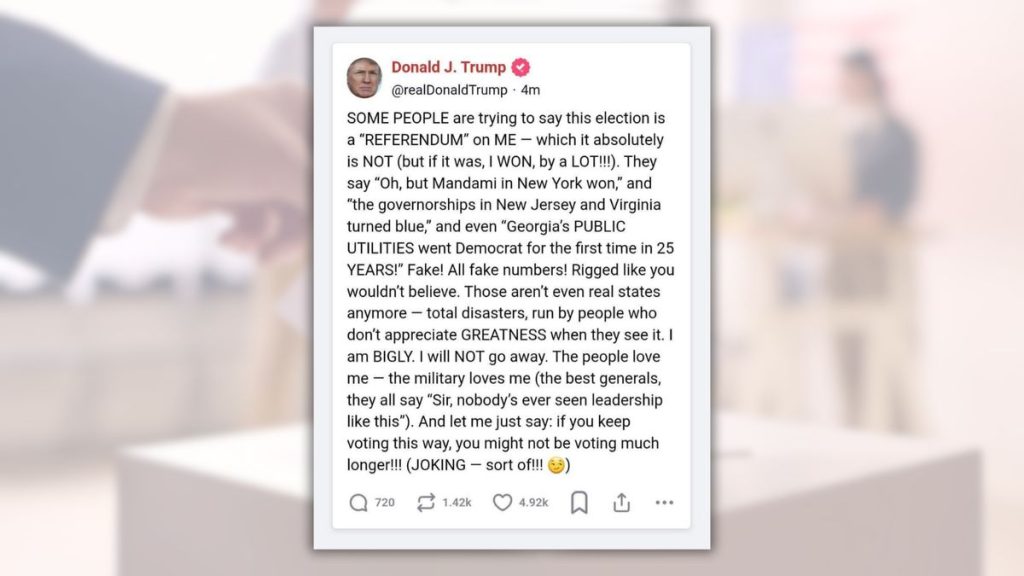Listen to the article
In an era where social media misinformation spreads rapidly, a fabricated post attributed to President Donald Trump has been circulating widely online, falsely suggesting he made threatening remarks about Americans’ voting rights following the November 2025 elections.
The manufactured post, which gained significant traction on Facebook before spreading to other platforms like Threads and Instagram, purportedly showed Trump responding to Democratic victories in gubernatorial races in Virginia and New Jersey, as well as the New York City mayoral election.
In the fake message, Trump allegedly wrote: “SOME PEOPLE are trying to say this election is a ‘REFERENDUM’ on ME – which it absolutely is NOT (but if it was, I WON, by a LOT!!!).” The fabricated post continued with claims about “fake numbers” and “rigged” elections before ending with the inflammatory statement: “And let me just say: if you keep voting this way, you might not be voting much longer!!! (JOKING – sort of!!!).”
A White House press office spokesperson confirmed to fact-checkers that the post was indeed fake. Further investigation revealed that the message did not appear on Trump’s official Truth Social feed on November 5, when it was claimed to have been posted. It was also absent from TrumpsTruth.org, a comprehensive online archive of the president’s Truth Social activity.
Digital forensics experts noted that the fabricated post lacked the distinctive black, green, and white Truth+ badge that appears on authentic posts from Trump’s verified account. The forgery was likely created using one of several online tools designed to generate fake social media posts that mimic the appearance of legitimate content.
While the viral post was fabricated, President Trump did make authentic comments about the November 4 elections on his Truth Social platform. These genuine posts advised his supporters against voting for Democratic candidates and criticized what he termed “Fake Polls” from the “Radical Left Media” while praising his performance in what he called “Fair Polls” and “Reasonable Polls.”
This incident marks just one in a growing pattern of manipulated content circulating around political events. Fact-checkers also investigated another fabricated Trump post following the same elections, which falsely showed the president writing, “Fine, America. F*** YOU!!!!”
The spread of such convincing forgeries highlights the increasing challenge voters face in distinguishing authentic political communication from sophisticated fakes. Social media platforms continue to struggle with effectively labeling or removing such content before it reaches widespread audiences.
Media literacy experts warn that as AI-generated content becomes more sophisticated, the problem is likely to intensify. They recommend that users verify political statements by checking official accounts directly rather than trusting screenshots shared on social media.
The fabricated post emerged amid heightened political tensions following Democratic victories in several traditionally competitive states, making the inflammatory content particularly potent in an already polarized information environment.
According to election analysts, the Democratic successes in Virginia and New Jersey governorships, along with the New York mayoral race, represent significant political developments that will influence strategy for both major parties heading into future election cycles.
Fact Checker
Verify the accuracy of this article using The Disinformation Commission analysis and real-time sources.




10 Comments
Misinformation about voting rights and election integrity is a serious issue that requires a robust response. I hope social media platforms continue to aggressively monitor and remove this type of manipulated content.
While it’s disturbing to see this kind of manipulated post spreading, I’m encouraged by the White House’s swift action to confirm its inauthenticity. Ongoing efforts to combat misinformation are essential for protecting our democratic processes.
This case highlights the need for greater media literacy and critical thinking when consuming political content online. We must all be vigilant about verifying the sources and validity of information, especially during election cycles.
It’s disheartening to see such blatantly false content attributed to a public figure, especially on sensitive topics like voting rights. Diligent fact-checking and rapid response are critical to maintaining trust in our institutions.
Fabricated social media posts like this one are a serious threat to our political discourse and must be addressed head-on. I’m glad to see fact-checkers and authorities working quickly to identify and debunk this kind of disinformation.
While it’s troubling to see this kind of inflammatory false content circulating, I appreciate the fact-checking efforts to identify and shut down the spread of the fabricated Trump post. Maintaining election integrity is paramount.
This fabricated post is a concerning example of the challenges we face in the digital age. Verifying the authenticity of online political content is crucial to preserving democratic norms and processes.
Absolutely. Fact-checking and debunking efforts are essential to combat the proliferation of misinformation, which can have real-world consequences for voters and the electoral process.
This is a concerning case of misinformation spreading rapidly on social media. We need to be vigilant about verifying the source and authenticity of political posts, especially anything attributed to public figures.
Fabricated posts claiming to be from political leaders are extremely dangerous and undermine public trust. I’m glad the White House confirmed this as fake – it’s critical to swiftly debunk such disinformation.